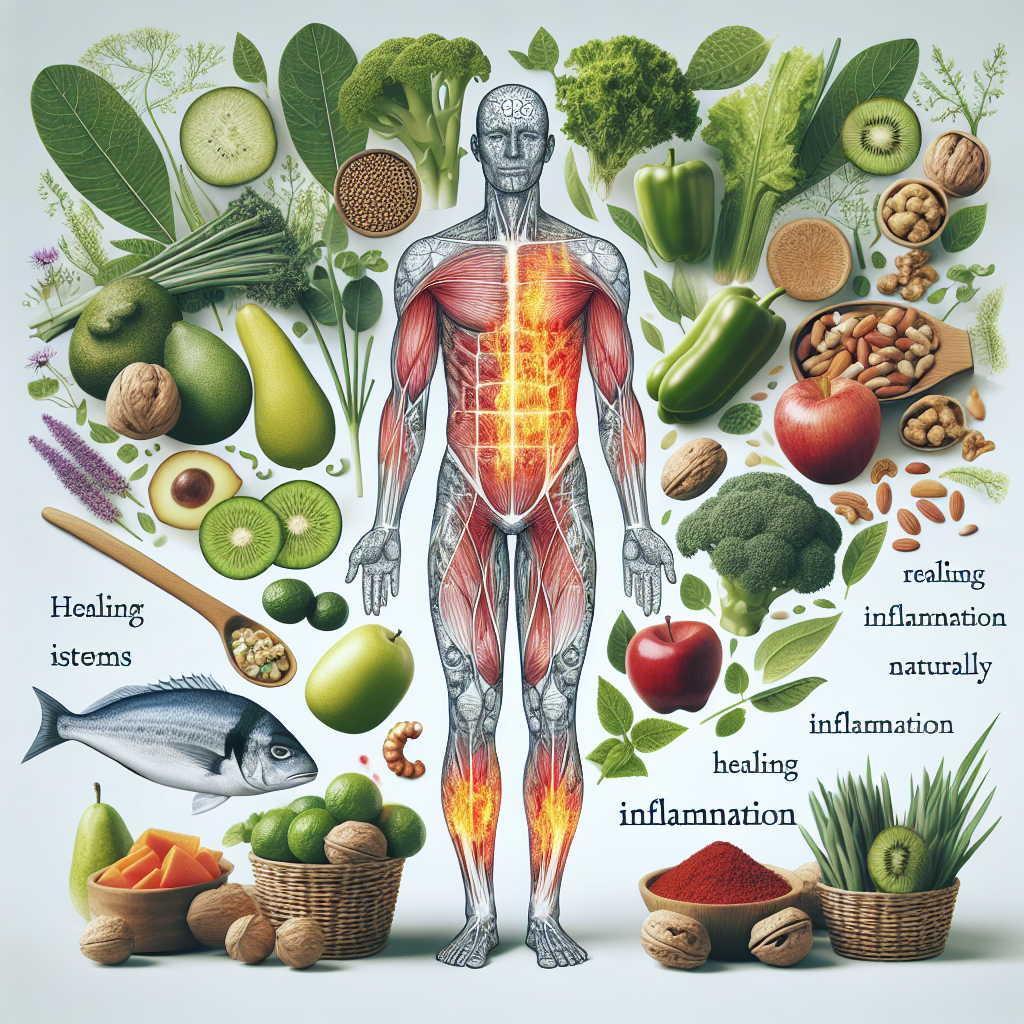How to Reduce Inflammation in the Body Naturally
Inflammation is a biological response of the body to harmful stimuli, such as pathogens, damaged cells, or irritants. While acute inflammation is a normal and protective response, chronic inflammation can lead to various health issues, including heart disease, diabetes, arthritis, and even cancer. Fortunately, there are natural ways to reduce inflammation in the body. This article will explore these methods, emphasizing dietary changes, lifestyle adjustments, and the incorporation of natural supplements.
1. Dietary Changes
a. Anti-Inflammatory Diet
Adopting an anti-inflammatory diet is one of the most effective ways to reduce chronic inflammation. This diet focuses on consuming whole, unprocessed foods rich in nutrients, antioxidants, and healthy fats.
b. Foods to Include:
– Fruits and Vegetables: These are rich in vitamins, minerals, and antioxidants. Berries, leafy greens, tomatoes, and citrus fruits are particularly beneficial.
– Healthy Fats: Omega-3 fatty acids found in fish, flaxseeds, chia seeds, and walnuts have potent anti-inflammatory properties.
– Whole Grains: Brown rice, quinoa, and oats provide essential nutrients and fiber that help reduce inflammation.
– Nuts and Seeds: Almonds, walnuts, and flaxseeds contain healthy fats and antioxidants.
– Herbs and Spices: Turmeric, ginger, garlic, and cinnamon have powerful anti-inflammatory effects.
c. Foods to Avoid:
– Processed Foods: These often contain trans fats, refined sugars, and artificial additives that can trigger inflammation.
– Sugary Foods and Beverages: High sugar intake can lead to increased inflammation and insulin resistance.
– Refined Carbohydrates: Foods like white bread and pastries can spike blood sugar levels, leading to inflammation.
– Red and Processed Meats: These can contain pro-inflammatory compounds and saturated fats.
2. Lifestyle Adjustments
a. Regular Exercise
Engaging in regular physical activity helps reduce inflammation by lowering levels of inflammatory markers in the body. Aim for at least 150 minutes of moderate-intensity exercise, such as brisk walking, swimming, or cycling, each week.
b. Stress Management
Chronic stress can contribute to inflammation. Techniques such as mindfulness meditation, yoga, deep breathing exercises, and progressive muscle relaxation can help manage stress levels.
c. Adequate Sleep
Lack of sleep can increase inflammation. Aim for 7-9 hours of quality sleep per night. Create a sleep-friendly environment by maintaining a regular sleep schedule, keeping your bedroom cool and dark, and avoiding screens before bedtime.
d. Hydration
Staying properly hydrated helps maintain bodily functions and reduces inflammation. Aim to drink at least 8 cups of water daily, more if you are physically active or live in a hot climate.
3. Natural Supplements
Several natural supplements can help combat inflammation. However, it’s essential to consult a healthcare provider before starting any new supplement regimen.
a. Turmeric (Curcumin)
Curcumin, the active compound in turmeric, has strong anti-inflammatory properties. It can be taken as a supplement or added to foods in its natural spice form.
b. Omega-3 Fatty Acids
Fish oil supplements are rich in omega-3 fatty acids, which are known to reduce inflammation. The American Heart Association recommends taking 1-2 grams of EPA and DHA (types of omega-3s) daily.
c. Ginger
Ginger contains compounds that inhibit inflammatory pathways in the body. It can be consumed fresh, as a tea, or in supplement form.
d. Green Tea
Green tea is packed with antioxidants called catechins, which have anti-inflammatory effects. Drinking green tea regularly can help manage inflammation.
e. Probiotics
Probiotics support gut health, which is closely linked to inflammation. Supplements containing strains like Lactobacillus and Bifidobacterium can be beneficial.
f. Vitamin D
Low levels of vitamin D are associated with increased inflammation. Sun exposure, fortified foods, and supplements can help maintain adequate levels.
FAQs
Q1: Can inflammation be completely eliminated?
A1: Inflammation is a natural and necessary response of the immune system. Acute inflammation helps the body heal and fight off infections. However, chronic inflammation should be managed as it can lead to various health issues. While it may not be entirely eliminated, it can be significantly reduced with lifestyle and dietary changes.
Q2: How quickly can I see results from an anti-inflammatory diet?
A2: The timeline for seeing results can vary from person to person. Some individuals may notice improvements in a few weeks, while others may take several months. Consistency is key, and combining dietary changes with other lifestyle adjustments can enhance the benefits.
Q3: Are there any side effects of taking anti-inflammatory supplements?
A3: Most natural anti-inflammatory supplements are safe when taken as directed. However, high doses can cause side effects. For instance, excessive turmeric can cause digestive issues, and too much omega-3 can increase bleeding risk. Always consult a healthcare provider before starting any new supplement.
Q4: Can exercise worsen inflammation?
A4: While intense and prolonged exercise can temporarily increase inflammation, regular moderate exercise generally reduces it. It’s crucial to find a balance and listen to your body. If you have a chronic inflammatory condition, consult a healthcare provider to design an appropriate exercise plan.
Q5: How does stress contribute to inflammation?
A5: Chronic stress triggers the release of cortisol and other stress hormones, which can promote inflammation. Stress management techniques like meditation and yoga can help reduce stress and, consequently, inflammation.
Q6: Is it necessary to avoid all fats to reduce inflammation?
A6: No, not all fats are harmful. Healthy fats, such as those found in olive oil, avocados, and nuts, can actually reduce inflammation. It’s essential to avoid trans fats and limit saturated fats.
Reducing inflammation naturally is a holistic approach that involves dietary changes, lifestyle adjustments, and the use of natural supplements. By adopting these practices, you can improve your overall health and reduce the risk of chronic diseases associated with inflammation.

